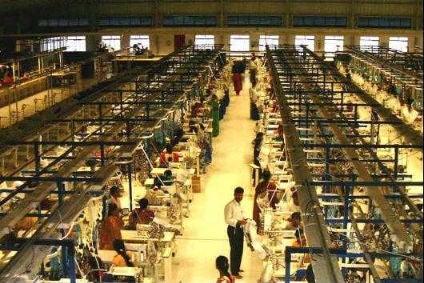
India’s Textile Minister and the country’s apparel export body have become the latest to appeal to global apparel buyers to “do commerce with compassion” and not cancel orders.
In a video message, Smriti Zubin Irani, textile minister for the Government of India, speaking on behalf of India’s Apparel Export Promotion Council (AEPC), called for brands and retailers to support the country’s export fraternity.
“India has always believed in the philosophy that ‘the world is one family.’ And there has been no such time in human history when that concept has been tested and found to be true. Now the world is engulfed in coronavirus and our fight against it will be a testament to humanity,” she said.
“Today I appeal to the buying houses, the buyers of the Indian textile and apparel industry. For years you have enjoyed the craftsmanship of our textile industry. Our Prime Minister has recently announced measures to protect the rights and wages of our workers. Today I appeal to you, stand together. Let’s show the world that we can do commerce with compassion. Do not cancel a single order that has been placed. Delivery schedules can be reworked. Payment plans can be extended. If we decide to work together, I reiterate my appeal, do not cancel orders. Let’s give the world an example that we can do commerce with compassion.”
A number of high street retailers have cancelled orders with suppliers and are said to be delaying payments as stores around the world are forced to close as part of country-wide lockdown measures to try to stem the coronavirus outbreak.

US Tariffs are shifting - will you react or anticipate?
Don’t let policy changes catch you off guard. Stay proactive with real-time data and expert analysis.
By GlobalDataNew Look recently said it was halting supplier payments and new orders. A retail supplier engagement specialist, Solutions for Retail Brands (S4RB), warned the move could cause “irreparable damage to New Look’s supply chain,” and that its supplier relationships will take years to repair – if at all.
Prior to this, Primark was widely criticised for cancelling all orders with its suppliers after closing its stores on 22 March, but has now set up a fund to cover the wages component of orders that it canceled in Bangladesh, Cambodia, India, Myanmar, Pakistan, Sri Lanka, and Vietnam.
This week, nine representatives from six major garment sourcing nations issued a joint call to global brands and retailers to consider the potential impacts on workers and small business enterprises in their supply chains when making purchasing decisions.
Garment manufacturer representatives in Cambodia, Vietnam, Pakistan, China, Myanmar and Bangladesh have come together in a joint effort as many report facing pressure from global buyers to cancel processed orders and/or delay payments.
A spokesperson for the Apparel Coalition of India told just-style the “sudden and unexpected” actions of some brands has resulted in “issues of grave concern.”
“Unfortunately, this unethical action started by one is now being followed by others. Indian exporters do not know how exactly to react to this, whom to communicate with or discuss the impending consequences regarding their business and workforce and future at large.”
The spokesperson said around 30 factories employing around 40,000-50,000 workers, 80% of which are women, are likely to be directly impacted by cancelled orders.
“To put it bluntly, India is a disposable country when it comes to apparel sourcing. We make up only 4% of apparel sourcing as compared to 8-12% of Bangladesh. There are also separate policies in place for the brands towards India and Bangladesh, which definitely favour Bangladesh.”
The spokesperson said the industry has to learn from the crisis going forward and “be a united front.”
“Government, brands, CSOs, suppliers, [we need to] respond collectively in order to rescue ourselves from this crisis and to rescue the apparel industry as a whole and make it sustainable for the future. If there is anything that this pandemic has taught us, it is that everyone and everything is interconnected in a globalised world and we must watch out for each other, no matter who we are and where we are.”




